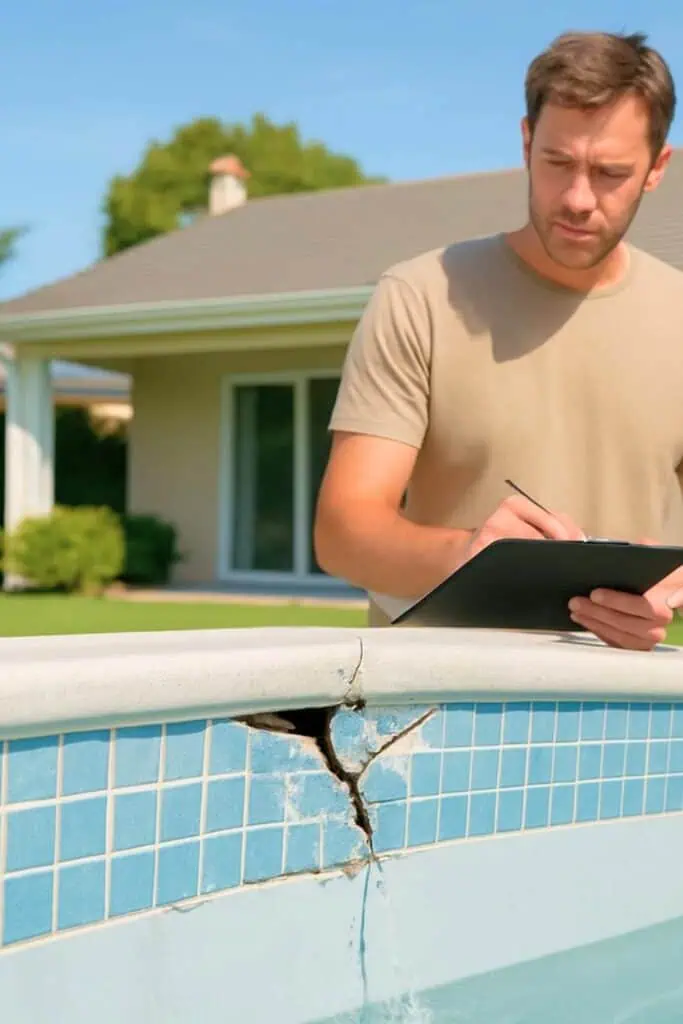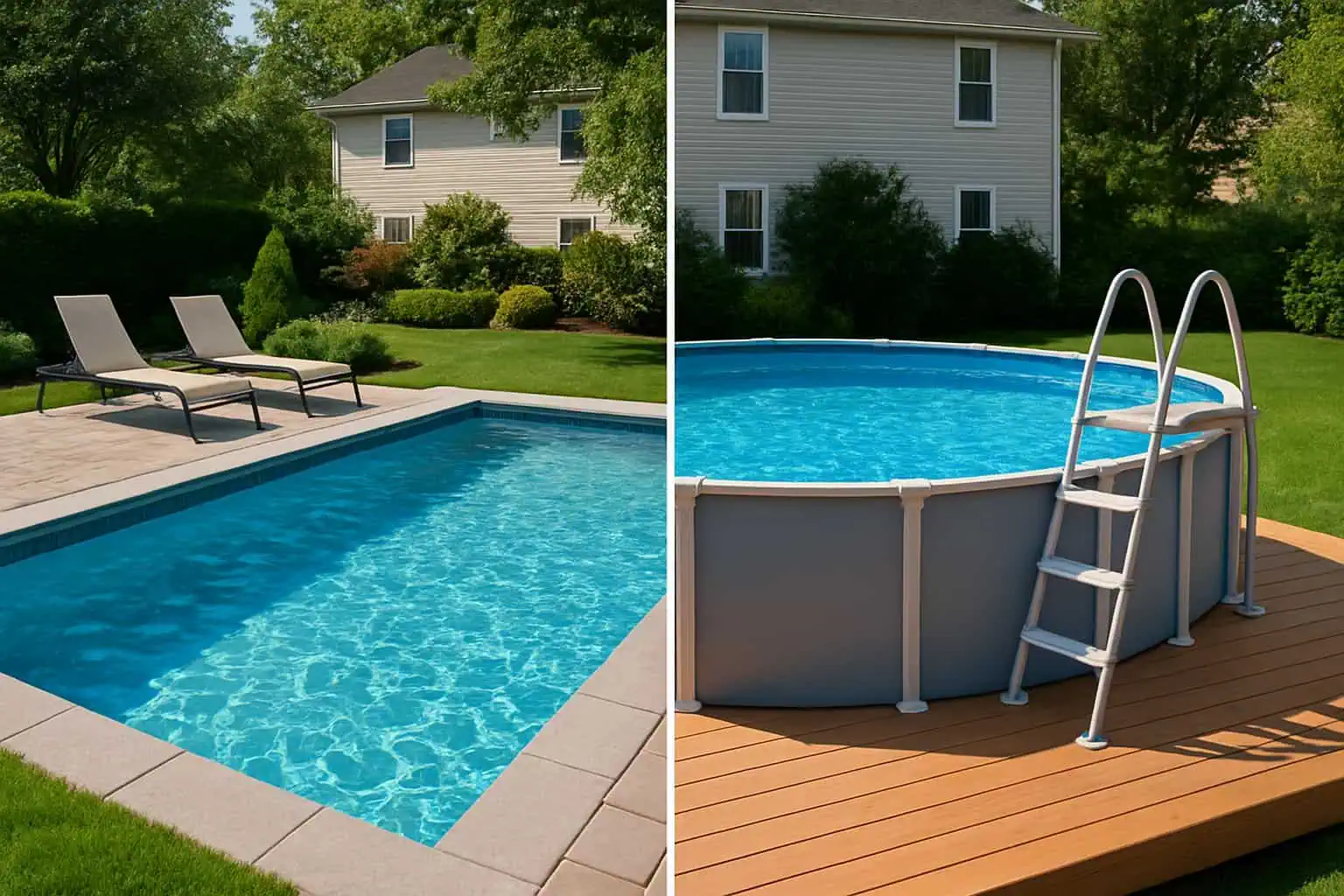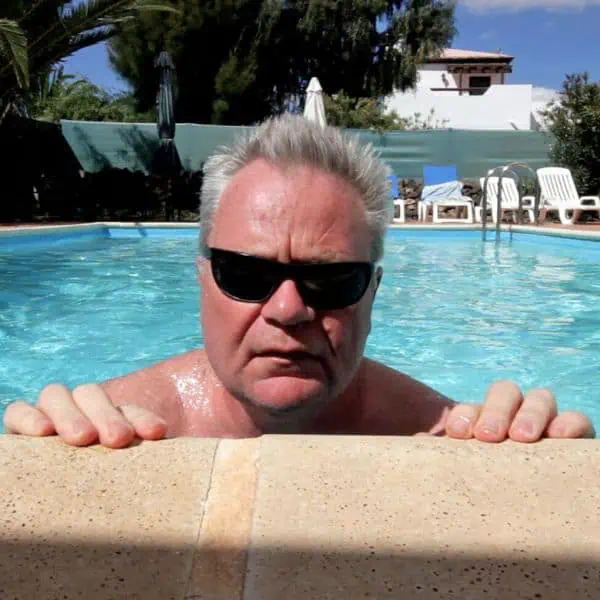Owning a swimming pool can be fun, but it brings up some real questions about how to keep it safe and protected. What if a storm rolls through and wrecks your pool? Or a fire? Or an eathquake?
Most homeowners insurance policies usually cover pool damage, but only for certain types of risks listed in your policy.

It’s worth understanding when your insurance actually steps in to help with repairs. Knowing what’s covered (and what isn’t) can seriously save you from headaches down the road.
Reading those tiny policy details? Not the most fun, but it’ll help you protect your property and your family.
Table of Contents
- What Types Of Pool Damage Does Homeowners Insurance Cover?
- Liability Coverage For Swimming Pool Owners
- Differences Between In-Ground And Above-Ground Pool Coverage
- What Is Not Covered By Insurance In Most Policies?
- How To Secure Additional Coverage For Pool Damage
- Filing A Claim For Swimming Pool Damage
- Tips For Choosing The Right Home Insurance For Pool Cover
- Other Related Insurance Policies To Consider
What Types Of Pool Damage Does Homeowners Insurance Cover?

Homeowners insurance generally covers your swimming pool against specific, unexpected events, but it definitely doesn’t cover everything. The coverage you get depends on your pool’s type, how it gets damaged, and whatever rules your insurance company sets.
Common Scenarios Covered
Standard homeowners insurance policies usually help out if your pool gets damaged by sudden accidents or disasters—think fire, storms, vandalism, or even a tree crashing down in a lightning storm. In those cases, you’re probably covered.
If your above-ground or in-ground pool is hit by something your policy lists as a covered peril, your insurer may pay for repairs. These perils often include:
- Fire and lightning
- Hail and windstorms
- Vandalism
- Falling objects
- Some types of theft
But if your pool falls apart from old age, lack of care, or slow cracking, you’re on your own. Always double-check your policy for the full list—every insurer is a little different.
Types of Pools And Coverage Differences
Insurance coverage really hinges on your pool’s type. In-ground pools usually count as “other structures” on your property, while above-ground pools might get lumped in as personal property or other structures, depending on how you set them up.
For in-ground pools, coverage limits often tie back to a percentage of your home’s insured value. Above-ground pools? They might have different limits or rules, especially if they’re more temporary. Hot tubs and spas? Those often come with their own fine print.
It’s smart to talk with your insurance company to make sure your pool—whatever type you have—gets included in your policy. How the pool’s built or attached can change what’s covered, and by how much.
Exclusions And Limitations
Most policies have limits and a bunch of exclusions for pools. For instance, they won’t pay for damage caused by:
- Earth movement, like earthquakes or sinkholes
- Wear and tear, aging, or lack of maintenance
- Water freezing, unless your policy clearly says otherwise
- Flooding, unless you have separate flood insurance
Insurers often exclude damage from poor care—like algae build-up or cracks from shifting ground. Some companies cap payouts for certain pools or want you to install extra safety features (locked fences, pool covers, that kind of thing) to keep your coverage.
Always check your policy for repair limits. If your pool is fancy or expensive, you might need to tack on extra coverage or bump up your limits to really protect your investment.
Liability Coverage For Swimming Pool Owners

Having a pool cranks up the odds that someone could get hurt on your property. Homeowners insurance gives you some protection if something goes wrong in or around your pool.
Personal Liability Coverage Explained
Personal liability coverage comes standard with most homeowners policies. It helps pay medical bills or legal fees if someone gets hurt in your pool and you’re found responsible.
If a guest slips on the pool deck or has an accident in the water, your liability coverage can step in. This part of your policy might also cover you if you get sued over a pool-related injury.
Policy limits usually range from $100,000 to $500,000, but you can go higher for extra peace of mind. Some folks add an umbrella policy for even more liability coverage.
Seriously, check your policy and chat with your insurer to make sure your pool is actually covered. Above-ground and in-ground pools sometimes get listed differently.
| Coverage Type | What It Covers |
|---|---|
| Personal Liability | Injuries to guests, lawsuits |
| Medical Payments | Medical bills for pool injuries |
Liability Risk And Legal Responsibility
If you own a pool, you’re taking on extra legal responsibility. You’ve got to keep the area safe—fences, clean water, you know the drill.
Accidents like slips, falls, or even drownings can lead to pricey claims or lawsuits. Even if someone sneaks into your pool without asking, you might still be on the hook.
State and local pool safety rules are a thing, so check those too. Your insurance company may require locked gates or pool alarms to keep your coverage.
Keeping your pool safe and supervised isn’t just smart—it can sometimes lower your insurance costs, too.
Differences Between In-Ground And Above-Ground Pool Coverage

Home insurance might cover both in-ground and above-ground pools, but the details can get weird. The pool’s materials, where it sits, and how much it’s worth all play a role in how your insurer treats it.
In-Ground Pools Specifics
An in-ground pool is usually seen as a permanent structure attached to your property. Most insurance companies put in-ground pools under dwelling or other structures coverage.
If fire, vandalism, or something similar hits your in-ground pool, you’re probably covered up to the other structures limit. But normal wear and tear, bad maintenance, or freeze damage? That’s usually on you.
Insurers might require a fence, pool cover, or locked gate for safety—and those things can affect your premium or even your policy’s validity. You’ll need to tell your insurer about any in-ground pool, since it ups your risk and might change your liability needs.
Considerations For Above-Ground Pools
Above-ground pools get treated differently. Sometimes your insurer calls it personal property, especially if it’s portable. Other times, it’s an “other structure.”
If your pool isn’t permanently installed, expect more limited coverage compared to in-ground pools. Your coverage may depend on the pool’s size, type, and value. You might have to show proof of value or explain how you use and store it.
Just like with in-ground pools, insurers expect safety measures—fencing, secure ladders, all that. Don’t be surprised if you have to specifically ask your insurer to add coverage for an above-ground pool. Coverage limits are often lower than for in-ground pools.
What Is Not Covered By Insurance In Most Policies?

Home insurance policies don’t cover every kind of pool damage. It’s really important to know the exclusions and limits, especially around pool care and water damage.
Maintenance Issues And Negligence
Insurance companies expect you to keep your pool in decent shape. If you let cracks go, ignore leaks, or let algae take over, don’t expect your insurer to bail you out.
Common maintenance exclusions include:
- Not cleaning the pool regularly
- Failing to fix minor damage
- Ignoring leaks or small cracks
If your pool liner tears just because it was worn out and you never replaced it, that’s “wear and tear” and it’s not covered. Insurers see pool care as your job. Claims from neglect? They’ll almost always get denied.
And don’t forget, you’ll pay your deductible on any valid claim before your insurance kicks in.
Limitations For Water Damage
Water damage from outside, such as flooding or groundwater, almost never gets covered by your home insurance. If heavy rain makes your pool overflow and ruins your yard, you’ll probably be paying for repairs yourself.
Policies also skip covering damage from water freezing in your pool. If you forget to winterize and the water freezes, any cracks or damage are your problem.
Even if your pool leaks and messes up other parts of your property, insurance usually only covers “sudden and accidental” leaks, not slow ones that happen over time. For flood-related damage, you’d need separate flood insurance.
Honestly, it’s worth asking your insurer how they handle pool water damage—just to be sure.
How To Secure Additional Coverage For Pool Damage

Standard home insurance policies sometimes just aren’t enough for your pool. Luckily, you have a few options to get more protection in case of unexpected pool damage.
Adding An Endorsement
You can add an endorsement to your home insurance for something specific. If your current policy barely covers pool damage (or doesn’t at all), ask your insurer about adding an endorsement.
A pool endorsement can help cover repair or replacement if your pool gets hit by a covered peril—like a storm or vandalism. Sometimes you can add extra liability protection too, which is a relief if someone gets hurt.
Call your insurer and ask what endorsements they offer for pools. Get the details in writing so you know exactly what’s covered and what’s not.
Raising Your Coverage Limits
A lot of home policies have limits that don’t come close to covering pool repair or replacement. Raising your limits bumps up the total your insurer will pay if something happens.
You can usually request higher limits on other structures or personal property coverage, depending on how your pool is classified. Some insurers let you pick a limit based on your pool’s value and size.
Ask your agent about the costs for higher limits—it’ll probably raise your premium. You might also need to add safety features to qualify. It’s smart to review your policy every year to make sure your coverage still fits your needs.
Filing A Claim For Swimming Pool Damage

If your pool gets damaged, knowing how to file a claim with your insurance company can make things a lot smoother. The process has some steps and deadlines you’ll want to follow to get your damage covered.
Steps To File A Claim
First, check your insurance policy to see if your pool damage is even covered. Look for the property damage details in your homeowners insurance.
Take clear photos and videos of the damage—it’s your best proof.
Contact your insurance company quickly. Most have a special phone number or website for claims.
You’ll need to fill out their claim form. Include all the key info: when the damage happened, how it happened, and anything else they ask for.
Hang on to any repair receipts, estimates, or messages from repair pros. They’ll help back up your claim.
Here’s a quick checklist:
- Review your policy for coverage
- Collect photos or videos as evidence
- Contact your insurer to start the claim
- Complete all paperwork
- Save all receipts and correspondence
What To Expect During The Claims Process
After you file a claim, your insurance company will probably send an adjuster out to look at the pool and see the property damage for themselves.
The adjuster might ask you about when and how the damage happened. Keep your photos, repair estimates, and any other proof handy—they’ll want to see those.
It’s not unusual for your insurance provider to ask for more documents or circle back with extra questions. Try to stay in touch and reply as soon as you can.
Once they finish the review, the insurer decides if your claim gets covered and figures out how much money you’ll get. Sometimes that’s a few days, but with more complicated claims, it can stretch into weeks. It really depends on your company and how tricky the claim is.
Don’t forget your deductible will come into play, and some damage might not be covered if it doesn’t match the perils listed in your policy. If you’re confused about anything, don’t be shy about asking your insurer for details.
Tips For Choosing The Right Home Insurance For Pool Cover
Finding the right home insurance for your pool means you’ve got to pay attention to both the insurance company’s reputation and the fine print in your policy. Not every policy is built the same, especially when it comes to pools, so actually comparing what’s offered matters.
Comparing Insurance Companies
When you’re comparing insurance companies, look for ones that spell out how they deal with swimming pool coverage. Some won’t touch homes with big in-ground pools or even certain above-ground pools. It’s worth double-checking this before you bother with a quote.
Here’s a quick table to help size up what different insurers offer:
| Company Name | Pool Type Covered | Liability Limits | Claims Process |
|---|---|---|---|
| Company A | In-ground, Above | $300,000 | 24/7 hotline |
| Company B | In-ground only | $500,000 | Online, Phone |
| Company C | Above-ground only | $250,000 | Local agents |
Check if the insurance company wants extra safety features like fences or pool covers—those can bump up your premium. And don’t just take their word for it; reading reviews and ratings from other customers is a good way to see how they actually handle claims and support.
Reviewing Deductibles And Policy Terms
Keep an eye on the deductible in your home insurance policy—it’s the amount you’ll have to pay if you ever file a claim. Since pool repairs can get pricey fast, a high deductible could leave you covering a big chunk yourself before your insurance even steps in.
Dig into the policy terms and see what kinds of pool damage actually get covered. Plenty of policies skip over things like damage from lousy maintenance or water freezing. Check those exclusions and any fine print about pool accidents, repairs to the structure, or your personal stuff.
Ask your insurance company if you need to officially report your pool. If you don’t list it, you could end up with a denied claim, and nobody wants that surprise. Make sure you know exactly what’s covered (and what isn’t) before you buy or tweak your policy. Not sure about something? Just call your insurance agent—they should be able to clear things up.
Other Related Insurance Policies To Consider
Basic home insurance or property insurance doesn’t always cover every kind of pool damage. There are some risks that need their own type of coverage if you want to really protect your pool investment.
Earthquake Insurance And Pools
Most homeowners insurance policies skip earthquake damage entirely. If earthquakes are a thing where you live, earthquake insurance could be pretty important for your pool.
Earthquakes can mess up your pool’s foundation or crack the sides, causing leaks and some pretty expensive repairs. Standard home insurance won’t step in unless you’ve got earthquake coverage.
You can get earthquake insurance as its own policy or tack it on as an endorsement to your property insurance. It’s what covers damage that’s directly caused by an earthquake. So, if an earthquake damages your swimming pool, you’re not totally on your own for repairs.
Be picky about the details before buying any earthquake policy. Some have high deductibles or cap payouts for pools and outdoor stuff. Give the policy a good read or talk with your agent—make sure your pool’s actually included.
Separate Pool Insurance Policies
Homeowners insurance just doesn’t cover every pool problem. If you’re looking for extra protection, you can go for separate pool insurance or tack special coverage onto your property insurance.
Separate pool insurance is built for things like pool equipment failures, leaks, or even accidents around your pool area. It can help pay for repairs that your regular property insurance ignores.
Some policies even toss in coverage for pool cages, enclosures, or decks. Got pricey pool features like slides, waterfalls, or lighting? Extra coverage might protect those too.
Always check what your homeowners insurance already handles before you add on anything else. Compare plans and ask what’s not included—it’s usually the stuff you assume is covered that isn’t.





Leave a Reply